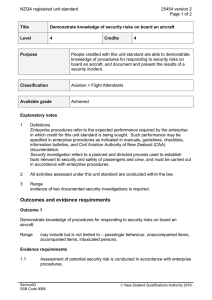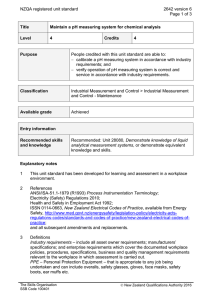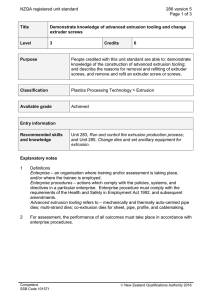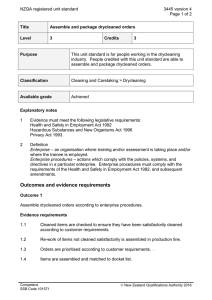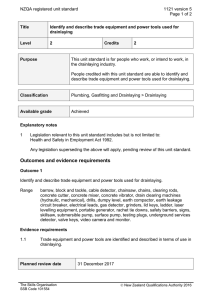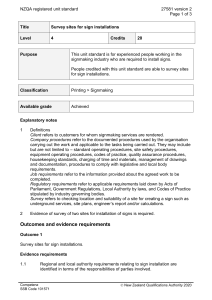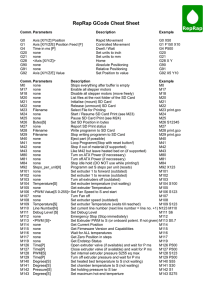NZQA registered unit standard 293 version 5 Page 1 of 3
advertisement
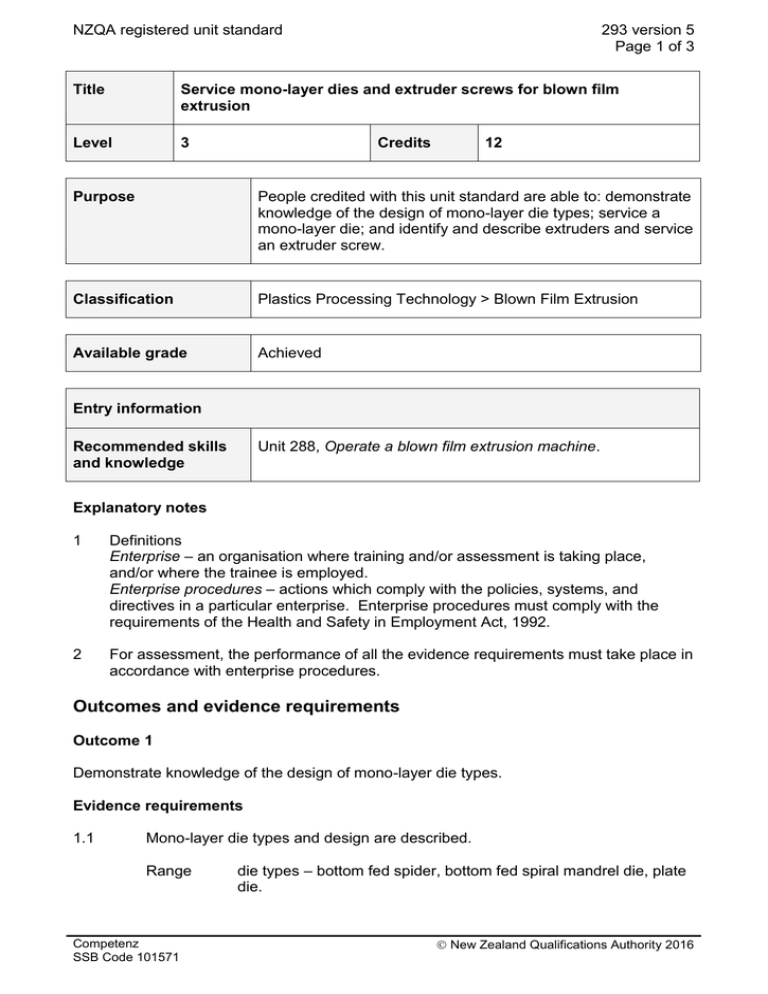
NZQA registered unit standard 293 version 5 Page 1 of 3 Title Service mono-layer dies and extruder screws for blown film extrusion Level 3 Credits 12 Purpose People credited with this unit standard are able to: demonstrate knowledge of the design of mono-layer die types; service a mono-layer die; and identify and describe extruders and service an extruder screw. Classification Plastics Processing Technology > Blown Film Extrusion Available grade Achieved Entry information Unit 288, Operate a blown film extrusion machine. Recommended skills and knowledge Explanatory notes 1 Definitions Enterprise – an organisation where training and/or assessment is taking place, and/or where the trainee is employed. Enterprise procedures – actions which comply with the policies, systems, and directives in a particular enterprise. Enterprise procedures must comply with the requirements of the Health and Safety in Employment Act, 1992. 2 For assessment, the performance of all the evidence requirements must take place in accordance with enterprise procedures. Outcomes and evidence requirements Outcome 1 Demonstrate knowledge of the design of mono-layer die types. Evidence requirements 1.1 Mono-layer die types and design are described. Range Competenz SSB Code 101571 die types – bottom fed spider, bottom fed spiral mandrel die, plate die. New Zealand Qualifications Authority 2016 NZQA registered unit standard 1.2 293 version 5 Page 2 of 3 Die rotation methods are identified and described. Range die rotation methods – continuous rotation, oscillating, die and extruder platform, oscillating haul off. Outcome 2 Service a mono-layer die. Evidence requirements 2.1 Die construction is interpreted in accordance with information on engineering drawings. 2.2 Die lip changing and setting is performed. 2.3 Die stripping and cleaning is carried out in accordance with manufacturer’s procedures. 2.4 Polymer contact surfaces are inspected for damage and results are reported. 2.5 Seals and sealing surfaces are inspected, inspection results are recorded and reported, and damaged seals are replaced. 2.6 Die routine maintenance and reassembly is carried out in accordance with manufacturer's procedures. Outcome 3 Identify and describe extruders and service an extruder screw. Evidence requirements 3.1 Extruder types are identified and described. Range 3.2 extruder types – water cooled barrel, air cooled barrel, smooth bore, grooved feed. Extruder screw design characteristics and types are identified and their application for different materials is described. Range design characteristics – feed zone, compression zone, metering zone, diameter, length to diameter ratio, compression ratio; types – general purpose, barrier, grooved feed, mixing section. 3.3 The reasons for removal and refitting of extruder screws is described and extruder screws are removed in accordance with machine manufacturer’s specifications. 3.4 Extruder screws and barrels are cleaned and inspected for wear and damage and results are recorded and reported. Competenz SSB Code 101571 New Zealand Qualifications Authority 2016 NZQA registered unit standard 3.5 293 version 5 Page 3 of 3 Extruder screws are identified and re-fitted in accordance with machine manufacturer’s specifications. Planned review date 31 December 2016 Status information and last date for assessment for superseded versions Process Version Date Last Date for Assessment Registration 1 28 April 1993 31 December 2014 Revision 2 13 February 1997 31 December 2014 Review 3 23 January 1998 31 December 2014 Review 4 27 October 2005 31 December 2014 Review 5 17 May 2012 N/A Consent and Moderation Requirements (CMR) reference 0134 This CMR can be accessed at http://www.nzqa.govt.nz/framework/search/index.do. Please note Providers must be granted consent to assess against standards (accredited) by NZQA, before they can report credits from assessment against unit standards or deliver courses of study leading to that assessment. Industry Training Organisations must be granted consent to assess against standards by NZQA before they can register credits from assessment against unit standards. Providers and Industry Training Organisations, which have been granted consent and which are assessing against unit standards must engage with the moderation system that applies to those standards. Requirements for consent to assess and an outline of the moderation system that applies to this standard are outlined in the Consent and Moderation Requirements (CMR). The CMR also includes useful information about special requirements for organisations wishing to develop education and training programmes, such as minimum qualifications for tutors and assessors, and special resource requirements. Comments on this unit standard Please contact Competenz info@Competenz.org.nz if you wish to suggest changes to the content of this unit standard. Competenz SSB Code 101571 New Zealand Qualifications Authority 2016

